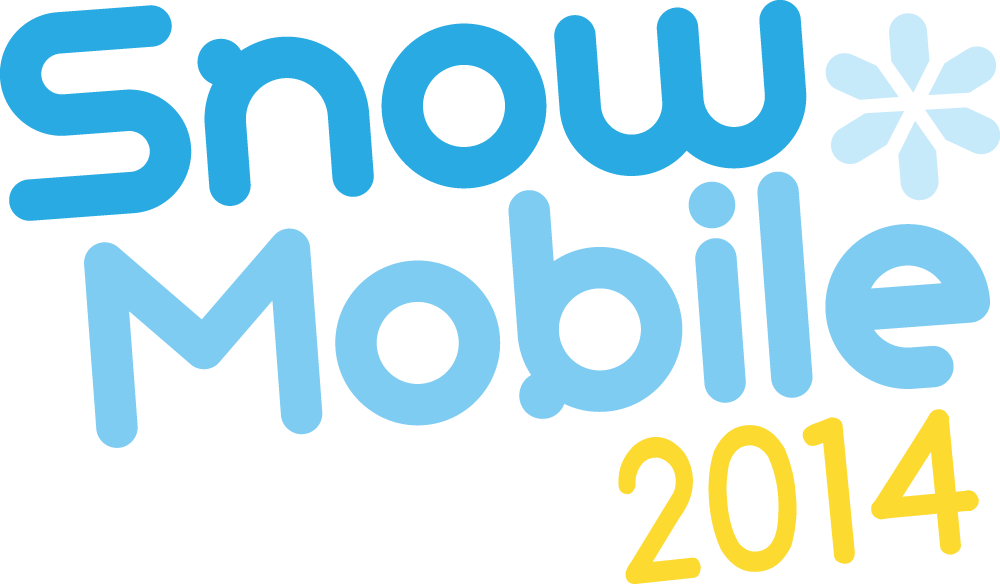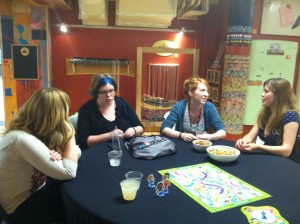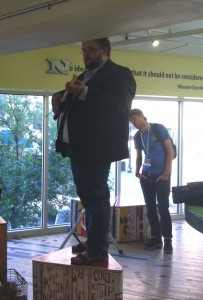Overview
Two weeks after I had my first tech talk I had my second tech talk. This second tech talk was at CocoaConf in Chicago.

My name isn’t in lights, but it’s still pretty awesome!
In some ways, this talk had higher stakes than my first talk did. CocoaConf is a more hard skills conference. CocoaConf is invitation only. Most of the people who speak at CocoaConf are well known developers in the Cocoa community. My talk was only going to be in front of 20-30 people, but those people were going to be very well known people. Additionally, CocoaConf is very reputable about having well developed talks.
This was a very important opportunity I was being given. It was very important to me that I not embarrass myself or let down the people who were giving me this chance.
Considerations
I was trying to figure out how in-depth to make my talk. From speaking with other people, I was under the impression that most people think that doing audio programming is hard. Part of what I wanted to convey with my talk was that audio programming doesn’t have to be hard, but then since audio programming is easy, then why am I doing a whole talk about it?
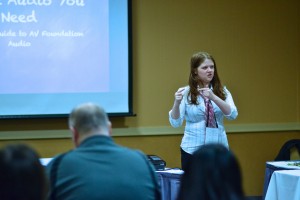
Picture of me delivering my talk in Chicago
I decided to err on the side of just showing what could be done easily. I spoke to a few people about how hard people expect what I talk about to be and I was told that no one was expecting WWDC-level complexity.
Also, I hoped that by focusing on audio session-based demos that it would have a nice, cohesive block of information that I could cover in an hour without glossing over anything or running out of time.
I tried to think about what the fundamental things were that people would want audio for. I know that I personally would like to build a synthesizer, but that it would take years to learn and what I am interested in is highly specialized.
Most of what people use audio for is just recording and playing back. These are things you can do with a few lines of code that used to take hundreds of lines of code. I made a determination to focus on things people could implement easily and achieve quickly.
Preparation
I knew based on what happened with my first tech talk that I really needed to make sure I practice my talk in front of an audience. After I finished that talk I approached Brad from Bendyworks about performing my talk at their workplace so that I could get an idea of how much material I have versus how much I need.
I got to perform my talk three days before I got to do it for real. I had a rough draft of my slides and working demos.
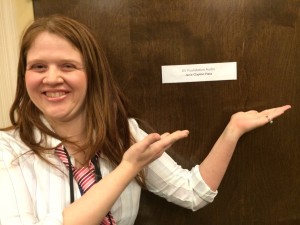
I am posing with the door that has my name on it 🙂
Everyone I talked to said to not include too much information on my slides. I did that in my first tech talk and that went badly. I was so nervous that I forgot to talk about things that weren’t on my slides. I know it isn’t super dynamic to have a lot of slides, but I wanted to make sure that I was providing the information I needed to.
One thing I figured out by practicing my talk was that if I just brought up a demo and tried to find the code I wanted to talk about I tended to stumble over it and not be able to find it while people were watching me. One change I made was to take screen shots of the code I wanted to talk about and include it as a slide rather than try to find what I wanted to talk about in the code base.
When I didn’t include code in my slides my talk was only half as long as I needed it to be.
I included a quiz in the talk because I wanted people to be engaged in my talk. One thing I added was to have multiple choice answers for the quiz because people tended to not remember the choices. Hell, I wrote the talk and I couldn’t even remember all of them off the top of my head!!
Having gotten an idea about what wasn’t quite working properly and how to pad out the talk somewhat I was ready to proceed to the main event!
CocoaConf Chicago
I had the great privilege to be in the first group of speakers after the keynote. I was planning to spend five minutes before my talk with my headphones on listening to music to get myself psyched and focused. That didn’t happen. I forgot that the Kleins ask you to pitch your talk to people in the morning, so I had to go up and do my spiel about why people should come to my talk.
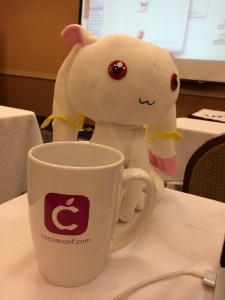
Kyubey posing with my special pink CocoaConf mug
Then everyone dispersed and immediately went to the rooms for the talks.
I had 10-15 minutes before my talk where everyone was waiting around in my room. I didn’t really want to start my talk early because I didn’t have enough material for that and there was a possibility that someone might come in at the time the talk was actually supposed to begin.
We had a few hiccups with my set-up. I didn’t think I needed a microphone or speakers, but Chris Adamson very wisely advised me to have some and since we had a bunch of time before the talk was supposed to begin we had plenty of time getting those things taken care of.
Still, after all of this set-up there was a substantial amount of time where there was waiting. I threw on my psyched music and I got to have five minutes of meditation before I had to perform.
One thing that I did for me was I had a stuffed Kyubey doll that I used as a prop in my talk. Kyubey is a character from Madoka Magica that makes contracts with girls giving them a wish in exchange for them battling evil.
I know he isn’t real, but having a “safety net” there where I could pretend that if things went really badly I could just make a wish to get another bite at the apple really helped me to not panic. I know that only one person in the audience understood the joke/reference. I hoped that if I didn’t spend too much time on it that if it didn’t go over well then it wouldn’t derail the whole talk.
Another thing that I did was I brought a bunch of candy with me. I didn’t want to just stand up there and talk to myself for an hour, so I brought candy to bribe people to engage me in conversation so that they weren’t just spending the whole talk checking their email and doing things on Twitter.
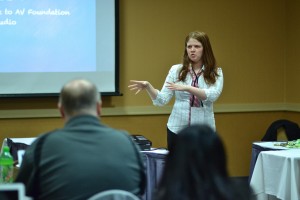
Yes, I have been told that I talk with my hands. A lot. Also that I should have pulled back my hair.
Overall, I think it went okay. I did have a few periods of my talk where I got really nervous. One thing that happens when I start having a panic attack is that I develop a speech impediment. This happened twice during my talk. I felt it coming on and I was able to shake it off before it got too bad.
I know that after I do more of these they will get better. Considering my level of expertise and comfort with doing something like this it could have been much worse. I know if I do more of these my delivery will get better.
Aftermath
So, I spent several weeks focusing on this talk. I was not employed at the time I was preparing for this talk so this was the only thing I had to focus on.
I was really happy that I got to go first. I could get the talk out of the way and enjoy the rest of the conference. Another aspect about going first that I didn’t take into consideration was how energetic people would be at the beginning of the conference. I noticed that with some of the later talks the next day people were tired and a little burned out. This was something I observed when doing my first talk. I didn’t think about what a gift it was to get people who were bright eyed and alert over people who were looking forward to going home to crash.
One thing I didn’t take into consideration was how keyed up I was about doing the talk. After I got done with the talk I crashed a little. I was sitting in another talk when I realized that I was done. It was over. This thing I had been waiting for a month to do and preparing for was over and I had nothing else I was looking forward to after it was done. That was a little sad.
My slides are here and my demo projects are here.
Comments
While sitting down to write this blog post I finally bit the bullet and read my comment cards.
I was expecting a lot of what I saw. People said I seemed nervous. I did some silly things in my talk. People said they wish I had not relied so much on my slides.
The one that I saw that really disappointed me was that many people complained that I didn’t tackle a hard enough topic. One person said they wished I had tagged this as a beginner talk and that they were expecting me to go more in depth with what you can do with audio programming rather than just the easy stuff.
I needed to make a decision about how hard to make the talk. I erred on the side of talking about something easier rather than harder because I didn’t want to frighten people away from audio programming. That might have been a mistake. I know it was something I struggled with and hoped I made the right choice on. I don’t know if the choice I made was right or wrong, but having more than one person explicitly say that it was the wrong choice makes me feel bad.
One thing people did not comment on that I expected to have commented on was my use of Kyubey. I didn’t utilize him as best I could. If I had been smarter or less stubborn I would have cut him from my talk. I included him just for me so that I would feel comfortable and that isn’t really a good thing to do.
In the future if I am going to include a prop I am going to include a prop that is a reference more than two people in the audience will understand.
Conclusion
Having the chance to talk at CocoaConf was one of the most amazing opportunities I have had. I am grateful to the Klein family for giving me the chance to speak. I hope that I did a good enough job that they would be open to me speaking there again.
I know if I want to be a better speaker I need to do it a lot more. I have been pitching a few talks to different conferences later in the year. I hope to have opportunities to learn and grow as a speaker.
One of my goals as a developer is to be able to share my knowledge with other people. I would like to write books and do talks. Being able to give back to this community is very important to me and I hope that I will be able to continue to contribute in the future.






